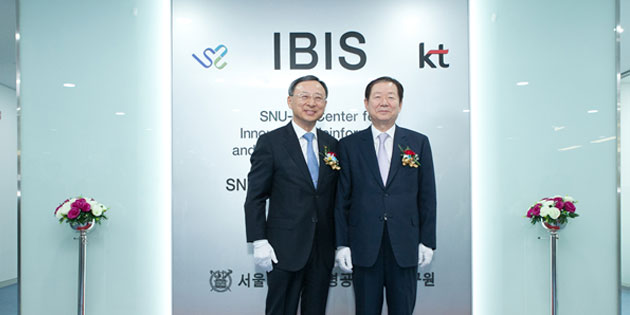
HWANG Chang-gyu (left), CEO of KT and SNU President SUNG Nak-in
Seoul National University recently collaborated with KT Corporation to open the Center for Innovative Bioinformatics and Systems Biotechnology (IBIS). The opening ceremony, held on September 15, was attended by SUNG Nak-in, President of Seoul National University, and HWANG Chang-gyu, CEO of KT (formerly Korea Telecom). IBIS is the largest research center in Korea that specializes in genome-analysis.
Located in N-Bio, the SNU biotechnology research institute, IBIS is capable of analyzing up to 100 whole genome structures in one week. The purpose of IBIS is to combine SNU's bioinformatics analysis technology and research expertise and KT's information and communication technology (ICT) and big data strategies. In doing so, the two institutions will develop core analytics solutions for genome information and create new businesses in the healthcare industry. Furthermore, SNU and KT aim to carry out more advanced research in the future, such as developing algorithms for cancer genome analysis and cancer companion diagnostic technologies.
Besides IBIS, there are other cases in which SNU jointly worked with KT in the biotechnology sector. Since May 2014, SNU and KT have cooperated to develop diagnostic techniques for cancer causing genes and genome analysis software. KT has also been working with other organizations to further expand its services in the healthcare industry.
Although KT is one of Korea's largest telecommunications company, it has tried to reduce its heavy reliance on communication businesses by also investing in other various fields. KT has planned to make technological achievements with regards to many new industries including"smart energy,""integrated security,""next-generation media,""healthcare" and"intelligent traffic control." However, because KT has limited knowledge and technology in non-telecommunications fields, it is seeking to cooperate with institutes who are already experts in relevant topics. For example, KT merges its big data and cloud system with information from LabGenomics Clinical Laboratories to help parents predict and prepare for any childhood illnesses that their child may be affected with. In this context, IBIS would be another example of how KT's big data solutions acquired from many years of telecommunication experience can be integrated with SNU's highly advanced bioinformatics and biotechnological analytics. Such partnership is expected to create a synergy effect that can benefit patients.
Hwang, the CEO of KT, expressed his aspirations of fostering IBIS into a worldwide research institute representing Korea. He explained,"IBIS will integrate ICT and BT (biotechnology) to lead the academia, improve the quality of people's lives and contribute to raising Korea's national competency by commercializing research results."
Written by YOON Jiwon, SNU English Editor, jiwonyoon@snu.ac.kr
Reviewed by Eli Park Sorensen, SNU Professor of Liberal Studies, eps7257@snu.ac.kr

